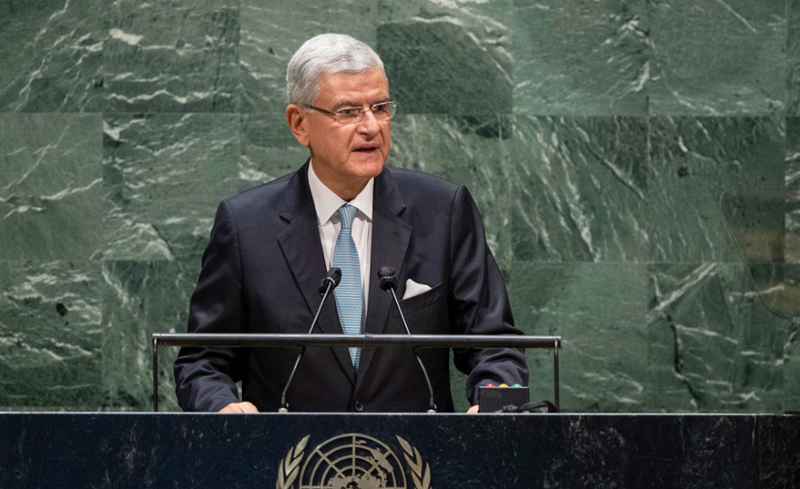 UNGA
UNGA Renew ‘collective commitment to multilateralism’, urges Assembly President
New York: The COVID-19 pandemic may have prevented world leaders coming to New York to address the General Assembly in person, but the president of the world body stressed on Tuesday that the need for deliberation, is “higher than ever”.
After banging the gavel to open this year’s General Debate, Volkan Bozkir painted a picture of pummeled economies, overwhelmed healthcare systems and disrupted education, due to the coronavirus.
Highlighting that “the most vulnerable have suffered most”, he drew attention to the situation of refugees and migrants; surging risks of gender-based violence; children in the crosshairs of exploitation; and the rise of on ethnic and religious violence.
“Rarely has the whole of humanity faced such an imminent and common threat”, the added. “We must leave our differences and disagreements aside…[and] renew our collective commitment to multilateralism”.
He underscored that combined efforts are needed to solve global problems, saying “‘We, the peoples of the United Nations’ can achieve this”.
‘Unrivalled legitimacy’
After World War II the Organization was founded as “a collective commitment to the progress of humanity”, Mr. Bozkir said, and with “unrivalled legitimacy at its centre”, it has endeavored to ensure “peace, prosperity and progress for all”.
“The system was designed to be flexible, so we can address a range of challenges and unexpected issues”, including the pandemic. he continued. “We can plan, innovate and build back better for a sustainable, inclusive and just recovery”.
COVID-19 recovery
As the pandemic will continue to change how the UN operates, Mr. Bozkir maintained the need to “make full use of all the tools available to us to combat this challenge”, including the Assembly, which he called “a key platform to provide political guidance”.
“I urge Member States to be cooperative and creative, to devise solutions, that will enable this body to function effectively, and remain relevant”, he said.
Increasing demands
Since the UN was founded 75 years ago, its demands have grown “immeasurably”. He elaborated that it supports peace and security with 95,000 peacekeepers stationed in 13 global operations throughout volatile regions; coordinates tens of billions of dollars in humanitarian appeals for millions in need; supplies vaccines to half the world’s children, saving three million lives a year; and strengthens and promotes the protection of people around the world, through the Human Rights Council.
And the pandemic has only increased demands on the system.
Fit for purpose
Mr. Bozkir argued that the Organization needs to “enhance coordination, coherence, efficiency and delivery capacity” by engaging further across the UN’s three key pillars of peace and security, human rights and development.
UN agencies must be strengthened and “we must be prepared to have tough, honest conversation about where the multilateral system is failing, or where it is not adapting fast enough, to the ever-evolving challenges we face”, he said.
Putting people first
He urged delegates to consider the people they serve as individuals, and zeroed in on specific cases, such as a child whose education is disrupted by the pandemic or a terrorist victim who needs long-term physical and psychological support, saying “these people need our helping hand”.
“The multilateral system is the best system available to provide solutions to complex issues, such as climate change, peace and security, human rights protections and global pandemics”, Mr. Bozkir upheld.
Topping the agenda
In outlining his priorities, the Assembly president stressed the need to recommit to and strengthen multilateralism, which as the world’s “foremost forum to address issues that transcend national boundaries”, is essential to fulfil the UN’s core mandates.
Mr. Bozkir’s second priority was to advance the humanitarian agenda, for which the pandemic serves to intensify existing vulnerabilities and inequalities – including millions of refugees in his own country, Turkey.
And in beginning the Decade of Action and Delivery to implement the Sustainable Development Goals, he recommended renewed efforts to achieve the 2030 Agenda, his third priority.
“The pandemic has affected all countries, large and small, north and south. It has, however, hit hardest the countries that are already vulnerable”, Mr. Bozkir detailed. “We must ensure that our efforts to recover from the pandemic are fully aligned with the implementation of the SDGs”.
Improve women’s lives
Turning to women and girls, he acknowledged that “gender inequality remains deeply entrenched in many societies”, rendering them without decent work, equal pay quality education or adequate healthcare.
Moreover, they suffer from violence and discrimination and are often under-represented in political and economic decision-making processes.
In recovering from the pandemic, “we must renew our commitment to protect women’s rights and make women’s participation in peace, security and humanitarian action meaningful and sustained”, he declared.
Choose trust
Mr. Bozkir reflected on the Organization’s founders in considering how the myriad challenges we face can be overcome, noting that “when we have worked together, humanity has prevailed.”
He closed by imploring Member States to “use this Organization to its fullest potential and…to come together for the benefit of all”.
Support Our Journalism
We cannot do without you.. your contribution supports unbiased journalism
IBNS is not driven by any ism- not wokeism, not racism, not skewed secularism, not hyper right-wing or left liberal ideals, nor by any hardline religious beliefs or hyper nationalism. We want to serve you good old objective news, as they are. We do not judge or preach. We let people decide for themselves. We only try to present factual and well-sourced news.







